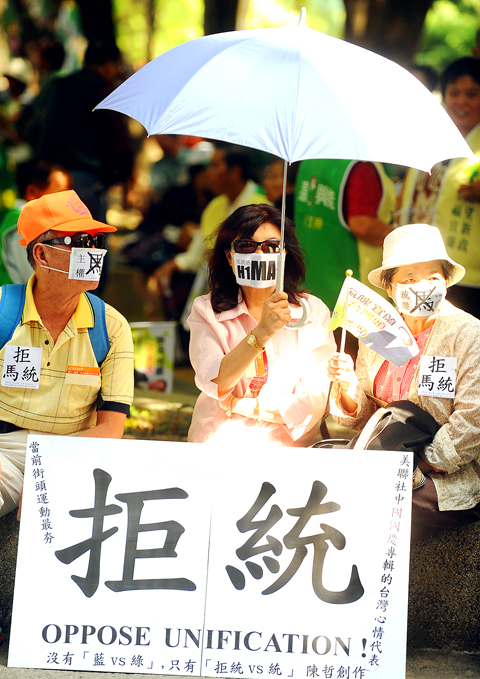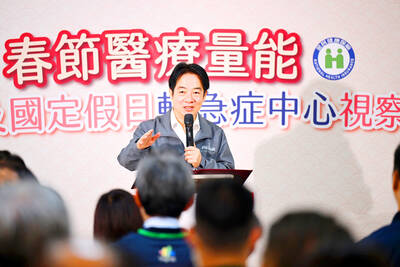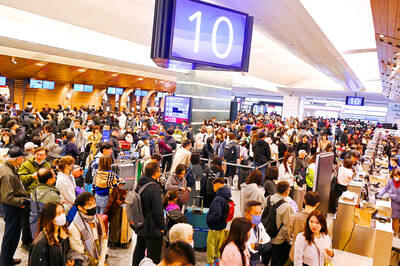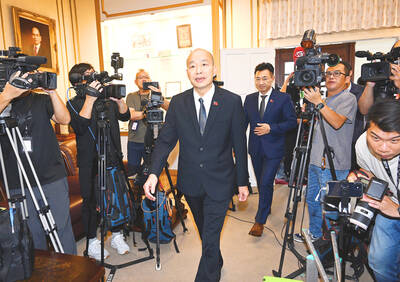Democratic Progressive Party (DPP) Chairperson Tsai Ing-wen (蔡英文) yesterday said that her party would make Taiwan a better country if given the chance by voters and urged candidates for the year-end local government elections to work hard to rebuild confidence in the party.
“Right now, the people are giving us a chance to prove that we’re still upholding the DPP’s core values and ideologies, and to prove ourselves to be the party that is closest to the people,” Tsai told delegates at the party’s annual National Convention in Taipei. “We should shoulder the responsibility to present ourselves as not only a better choice than the current Chinese Nationalist Party [KMT] administration, but also better than how the DPP performed in the past.”
It’s a critical moment for the DPP, since the public have voiced their discontent with the current government a little more than a year since President Ma Ying-jeou (馬英九) was inaugurated with overwhelming popular support, she said.

PHOTO: CHANG CHIA-MING, TAIPEI TIMES
“In the past year, we’ve seen economic recession on an unprecedented scale, with the unemployment rate hitting a record high,” Tsai said. “The government does not use its resources to look after the disadvantaged; it only cares about rich corporations; it faces and handles natural disasters with a careless attitude; its appeasing policies toward China have meant civil servants and public officials are not willing to defend Taiwan’s sovereignty and dignity.”
When it comes to comparing local governments under the leadership of the DPP and the KMT, Tsai said DPP members had achieved much when heading local governments — such as the Dongshan River Water Park and the International Folklore and Folk Game Festival in Yilan, the Bali Left Bank Park and the Fishermen’s Wharf in Taipei County, the project to turn Love River (愛河) in Kaohsiung into a popular tourist attraction and the success of the World Games in July.
“When we look at the cities and counties under the KMT’s control, we see the Maokong Gondola that has been out of service for more than a year and the Muzha-Neihu Mass Rapid Transit line that is still full of problems, the broken promise of building a branch of the Guggenheim Museum in Taichung, the failure of the Yilan International Rain Festival and the out-of-place Ma Village [馬家庄] in Miaoli County,” Tsai said.
Ma Village is a Hakka village in Tongsiao Township (通霄), Miaoli County, where the majority of the people bear the surname Ma (馬). Having never lived in the village and having learned of its existence in his 40s, Ma, who was born in Hong Kong, decided to designate the village his hometown and goes there each year during the Lunar New Year.
After Ma was elected president, Miaoli County Commissioner Liu Cheng-hung (劉政鴻) of the KMT decided to promote tourism by using the connection to Ma and spent hundreds of millions of NT dollars renovating roads and constructing tourist facilities. Ma Village, however, did not receive as many visits as the county government expected.
Following the opening speech, all 14 DPP candidates for the year-end local government elections were introduced to the delegates.
“We must remember that ‘work hard, stay clean, love the country’ are our core beliefs forever,” Tsai said. “Let’s promise people that a better DPP that will make Taiwan a better place.”

NON-NEGOTIABLE: The US president’s action ran counter to one of the US’ ‘six assurances’ on not consulting China about arms sales to Taiwan, US lawmakers said US President Donald Trump’s admission that he is discussing arms sales to Taiwan with Chinese President Xi Jinping (習近平) is “alarming and a blatant violation of US policy and the six assurances,” US Representative Ro Khanna said on Tuesday. Trump on Monday said he would decide soon on whether to send more weapons to Taiwan, after Xi warned him not to do so. “I’m talking to him about it. We had a good conversation, and we’ll make a determination pretty soon,” Trump told reporters aboard Air Force One when asked about warnings raised by Beijing during a phone call with Xi over

REAL EMERGENCIES: To avoid overcrowding, the health minister urged people with mild or moderate symptoms to go to UCCs, while the ER should be for critical cases President William Lai (賴清德) yesterday inspected the nation’s Lunar New Year medical preparedness with a visit to an urgent care center (UCC) in Taipei and expressed confidence in the Ministry of Health and Welfare’s plans to prevent emergency room (ER) overcrowding during the nine-day holiday. The ministry in November last year launched a pilot UCC program to provide urgent medical care at 13 clinics in the nation’s six special municipalities over weekends and on holidays, aimed at relieving pressure on crowded ERs. To ease ER overcrowding during the Lunar New Year, when most hospitals and primary care clinics are closed, the National

HOLIDAY RUSH: Airport passenger volume is expected to reach a new high, while southbound road traffic would likely peak from Tuesday As Lunar New Year travelers flock overseas, passenger traffic at Taiwan Taoyuan International Airport is expected to shatter records, as Taoyuan International Airport Corp (TIAC, 桃園國際機場), Taiwan’s largest aviation hub operator, projected yesterday’s passenger volume to climb to 167,000. The figure comes after a record single-day high of 161,000 passengers on Thursday, and would surpass the previous pre-COVID-19 pandemic Lunar New Year peak of 166,000 passengers in 2019, TIAC said. Long lines could be seen forming as early as 7am yesterday, filling Terminal 1 of the airport almost to capacity, yet security checks took only 10 to 15 minutes. TIAC urged

TEAMWORK: All parties should prioritize national defense and key security issues, which requires cooperation and long-term, stable support, the DPP’s Chen Pei-yu said A proposed NT$1.25 trillion (US$39.66 billion) special defense budget would be a top priority for the Legislative Yuan when it reconvenes after the Lunar New Year holiday, Legislative Speaker Han Kuo-yu (韓國瑜) said yesterday after a group of 37 US lawmakers sent letters to Taiwanese politicians expressing concern over the stalled budget. Chinese Nationalist Party (KMT) members Han and Deputy Legislative Speaker Johnny Chiang (江啟臣) in a statement said they would help party caucuses deliberate about the special defense budget, adding that they value open, candid and sincere exchanges with the US Congress and take US lawmakers’ concerns seriously. Taiwan-US relations are